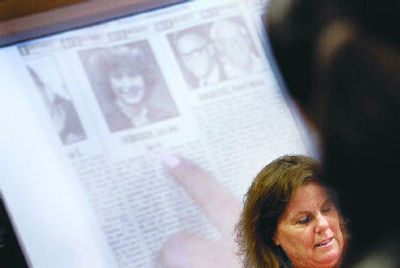Good grief

The children know her only as “Mrs. V.”
Although they will never meet her or even learn her name, the fifth- and sixth-graders at Meadow Ridge Elementary have grown to care about “Mrs. V.” They know that she has grandchildren. That she loves to sing. That she was born in Germany.
They also know she’s dying.
As she approaches the end of her life, “Mrs. V” – a patient at Horizon Hospice – has received dozens of cards from these students. They sent her drawings of flowers, sunshine and the German flag. One student wrote her a note about singing in a choir. Another told her she’s half-German. Many others conveyed a more simple, yet sincere message: “I am thinking of you.”
“We write to people who are sick and are in pain,” said 11-year-old Jacob Kalhar. “Maybe the cards make the pain stop for a little while, even for just a few moments.”
An elementary school classroom is probably the last place in the world where most people would bring up the subject of death, but that’s precisely why Cyndy Stevenson has made it a core lesson.
We live in a death-denying culture, said Stevenson, director of volunteers for Horizon Hospice, one of two organizations in Spokane that provides care to the terminally ill. As a result, people often don’t know how to grieve, she said. They also don’t know what to say or how to respond to other people’s loss.
To change this cultural attitude toward end-of-life issues, Stevenson has spent the past year talking about death and dying. She has made presentations to nursing students, caregivers and others in the health care field. She has met with people who live and work in nursing homes and assisted-living facilities. She also has talked to students in area classrooms about a topic that has long been considered taboo.
“You give them hope,” Stevenson recently told the Meadow Ridge class in Mead. “These cards make a big difference. They look at these for hours and hours and they make people smile.”
Without revealing the patients’ names to protect their privacy, Stevenson talks to students about the people and families who seek hospice care. In addition to “Mrs. V,” who sang a duet during a recent visit with a hospice volunteer, Stevenson told the class about “Mrs. L,” who lost her husband this month to cancer. “She will miss his sense of humor and traveling with him,” she said. “She took care of him all day, every day, for many weeks.”
The cards that students make for patients and families at Horizon Hospice have provided an entry point into the complex subject of death and dying, Stevenson said. In addition to offering their sympathy, the students also learn about end-of-life issues by reading obituaries from the newspaper and talking about the legacies that people leave behind.
As they pored through some recent obituaries, students paid careful attention to the words people used to describe their loved ones who had just passed away. One man who died last month at the age of 34 will be remembered for his “calm spirit, loyalty, great smile and amazing chocolate chip cookies,” a student pointed out. Another obituary showed a photograph of a woman with gentle eyes and a kind smile who was known for the way she nurtured young children.
“Are we in the middle of leaving a legacy?” asked Stevenson, prompting students to consider the effects of their everyday actions. “What do you want people to remember about you? How have you touched people’s lives?”
In some classes, Stevenson asks students to reflect on their own lives by asking kids to respond to these prompts: “Here is the way I would like my legacy to read at the end of my life,” and “Here’s my plan to tune up my legacy (new choices, efforts, change in thinking).”
Because of recent medical advancements, doctors have been able to cure diseases and prolong life, said Loren Guske, owner and administrator of Horizon Hospice. “Death is no longer acceptable to people,” he said. “But this attitude also can be damaging to our culture and society because all of us are going to die.”
Changing this attitude about death has become one of the goals of Horizon Hospice, a Bible-based for-profit that has served more than 1,500 families since 1998.
Hospice care – which focuses on a patient’s comfort and quality of life rather than a cure during the final phase of a terminal illness – means providing emotional, social, psychological and spiritual support, said Guske. The focus is on affirming life, he said, especially as they approach its end.
More than 80 percent of older Americans would prefer to die at home, a Gallup poll found. But in Spokane County, fewer than 30 percent of deaths occurred at home, according to Department of Health statistics.
People often don’t realize that hospice care is an option, said Stevenson.
“When no more can be done, we need to take care of people,” said Guske. “We can help take away a lot of unnecessary suffering. … We help people live until death occurs.”
Since Stevenson started talking to classes at Meadow Ridge and other schools about death, students say they now have a different perspective on dying and the value of reaching out to people no matter what stage they are in life.
They know not to say “I know how you feel” to someone who has lost a loved one. In the cards that they send to hospice patients, they’ve learned not to write, “Get well.”
They’ve also learned that it’s okay to feel sad, that it’s good to ask for help, that grief and loss are an inevitable and integral part of life.
“I used to be afraid of death,” said 11-year-old Krysta O’Brien. “But I’ve realized that it’s going to happen to everyone. I’m just going to live my life to the fullest.”